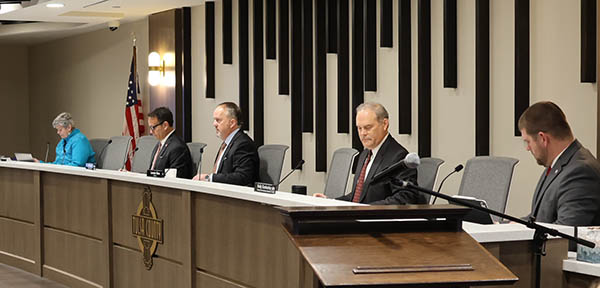Commissioner Duties
Districts
The Board of County Commissioners, created by the State Constitution, is composed of three Commissioners elected by the people. The County is divided into three districts, as equal in population as possible and numbered 1, 2, and 3 respectively. One Commissioner is elected from each district. District boundaries are set once every 10 years following the federal census.
Duties of the County Commissioner
There are three county commissioners’ districts in every county in Oklahoma. The districts are approximately equal in population and numbered as district one, two and three. A county commissioner is elected by the electors within a district to serve on the board of county commissioners. The board of county commissioners is the chief administrative body for the county. Many citizens perceive a county commissioner as mainly being responsible for maintaining and constructing the county roads and bridges. While these are important duties required by the office, a county commissioner, as a member of the board, is also responsible for setting and administering policies for the county.
The board of county commissioners is required by law to hold, at the county seat, a regular meeting on the first Monday of each month to transact county business. The agenda might include legal, personnel and fiscal matters. In practice, more frequent meetings are held and an agenda is posted in advance within the courthouse. The board of county commissioners’ business meetings are open to the public.
By law, the commissioners must act as a board when entering into contracts or other agreements affecting the county’s welfare. Thus, actions taken by the board are voted on and approved by a majority of the commissioners.
The board of county commissioners has legal powers when acting in the county’s welfare. Among the powers granted by law are the authority to:
- Sell or purchase public land or buildings for the county.
- Call a county bond election for approving a public project or creating a special district. Incur public indebtedness in the county’s name.
- Implement an economic development program for the county.
- Purchase security contracts known as a blanket bond to insure all county officers and employees for any loss to the county when carrying out their duties.
- Approve the warrants for payments of claims for equipment or supplies purchased or leased by the county and the warrants for the county payroll.
- Receive and approve all bids on major purchases or construction projects.
- Authorize and maintain an inventory of all the property owned or leased by the county which exceeds $500 in value.
- Audit the accounts of the county officers.
- Develop minimum personnel policies for the county employees with the approval of a majority of all the elected county officers.
- Serve on and/or appoint members to trust authorities, service districts, county boards and councils.
- Designate and publish each year (in conjunction with the county excise board) the holidays on which the county offices may close.
- Lease tools, apparatus, machinery or equipment to an other county, political subdivision or state agency, or jointly buy equipment with other counties.
- Maintain and construct the roads and bridges in the county highway system.
The board of county commissioners plays an integral part in the receiving and expending county funds. As the county’s chief administrative body, the three county commissioners must make major financial decisions and transactions. Also, the board of county commissioners has the official duty to ensure the fiscal responsibility of the other county officers who handle county funds. By law, the board has the power and duty to audit the accounts of all the officers who receive and manage money belonging or appropriated to the county.
The board of county commissioners also has a role in the county budget process. (In counties that have elected to come under the County Budget Act, the budget board is the governing board of the county with respect to budget making. The budget board consists of the assessor, county clerk, court clerk, three commissioners, sheriff and treasurer.) Near the end of each fiscal year, the board must collect from each elected and nonelected county official a financial statement showing their expenditures and remaining revenues for the current fiscal year and their estimate of needs for the upcoming fiscal year. Furthermore, the board is required by law to prepare a statement showing the county’s current financial condition and the anticipated revenues for the upcoming fiscal year along with an estimate of needs for each county office. The county clerk assists the board of county commissioners or budget board in carrying out these duties. The information is published in a newspaper by the board of county commissioners and submitted to the county excise board. Final authority for funding each county office lies with the county excise board.
Unlike the misconception that county commissioners are only elected to build and maintain county roads and bridges, as members of the board of county commissioners, they are foremost policy makers and business managers for the county. All the review and approval procedures empowered to the board are a means to provide the public with a fiscally efficient system of county government.
